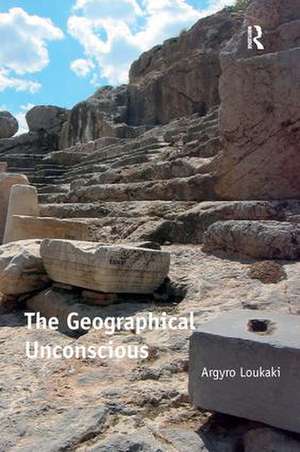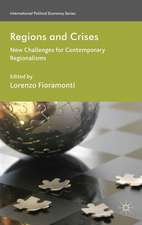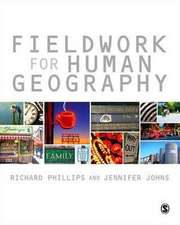The Geographical Unconscious
Autor Argyro Loukakien Limba Engleză Hardback – 25 mar 2014
| Toate formatele și edițiile | Preț | Express |
|---|---|---|
| Paperback (1) | 469.34 lei 6-8 săpt. | |
| Taylor & Francis – 28 noi 2016 | 469.34 lei 6-8 săpt. | |
| Hardback (1) | 1070.52 lei 6-8 săpt. | |
| Taylor & Francis – 25 mar 2014 | 1070.52 lei 6-8 săpt. |
Preț: 1070.52 lei
Preț vechi: 1305.51 lei
-18% Nou
Puncte Express: 1606
Preț estimativ în valută:
204.88€ • 212.08$ • 173.16£
204.88€ • 212.08$ • 173.16£
Carte tipărită la comandă
Livrare economică 05-19 martie
Preluare comenzi: 021 569.72.76
Specificații
ISBN-13: 9781409426271
ISBN-10: 1409426270
Pagini: 432
Ilustrații: Includes 96 b&w illustrations and 5 maps
Dimensiuni: 156 x 234 x 24 mm
Greutate: 0.91 kg
Ediția:New ed
Editura: Taylor & Francis
Colecția Routledge
Locul publicării:Oxford, United Kingdom
ISBN-10: 1409426270
Pagini: 432
Ilustrații: Includes 96 b&w illustrations and 5 maps
Dimensiuni: 156 x 234 x 24 mm
Greutate: 0.91 kg
Ediția:New ed
Editura: Taylor & Francis
Colecția Routledge
Locul publicării:Oxford, United Kingdom
Cuprins
Contents: Introduction; Part I Archetypal Spatialities: The space of heroes; Sappho: light and the sacred cosmologies of the human body. Part II Byzantine Participatory Spatialities and Modern Art: Byzantine art, Cubism, Surrealism; Mediterranean fermentations in early modernity: El Greco’s Mare Meum. Part III Modernity as Urban Visual Experience: Paris-Patras: modern urban geographies of visual elation. Part IV Cosmopolitan Modernisms and the East: F.L. Wright, D. Pikionis and N. Hadjikyriakos-Ghikas: Japanese space as archetype and unconscious; Frank Lloyd Wright and Japan; Dimitris Pikionis, Nikos Hadjikyriakos-Ghikas and the East. Part V Past-Future Space: Baroque cyberspatialities; In place of conclusions: space and vision: retraining and rebooting; Bibliography; Index.
Notă biografică
Dr Argyro Loukaki is Associate Professor, Hellenic Open University, and Head of Department of Archaeological Works, 1st Ephorate of Byzantine Antiquities, Greek Ministry of Culture and Tourism, Greece.
Recenzii
’The book you hold is a veritable intellectual tour de force. Precisely at a time when the debate over modernity seems to be over, Argyro Loukaki’s book opens up a radically new perspective that questions the very foundations of western-centric understandings of modernity. Her imaginative reworking of the geographical unconsciousness implies the need to take a stance articulated around a new aesthetic critique that breaks with post-modern indifference and embraces the ultra-modern necessity for a new ethics today.’ Erik Swyngedouw, Manchester University, UK ’An ambitious, eloquent and sensitive excavation of ways of thinking and seeing landscapes, places and spaces over the ages. This is a book to restore faith in the human ability to shape diverse worlds in ways consistent with ancient and modern ideals of justice, beauty and morality.’ David Harvey, CUNY Graduate Center, USA 'It’s a collection of SNAPASHOTS that cuts through geography, art history, philosophy and cultural studies. What makes ME particularly excited is it’s art-historical ambitions'. Kostis Kourelis, Franklin & Marshall College 'The diversity of geographical expressions explored by Loukaki is really notable. While many of them have already been individually examined, it is the first time that all of them become part of a comparative study. Poetry, Byzantine iconography, painting, urban design and architecture are presented here as communicators of geographical knowledge'. Society and Space ' ... this is a book that I believe deserves the attention of every cultural geographer open to dialogue with the humanities. And it is certainly a book that, consciously or unconsciously, will challenge the way of seeing modernity of man.' Geographical Review
Descriere
This ambitious and innovative volume stretches over time and space, over the history of modernity in relation to antiquity, between East and West, to offer insights into what the author terms the 'geographical unconscious'. She argues that, by tapping into this, we can contribute towards the reinstatement of some kind of morality and justice in today's troubled world. Approaching selected moments from ancient times to the present of Greek cultural and aesthetic geographies, the book examines diachronic spatiotemporal flows, which are cultural, urban or landscape related, in conjunction with parallel currents of change and key issues of our time.














